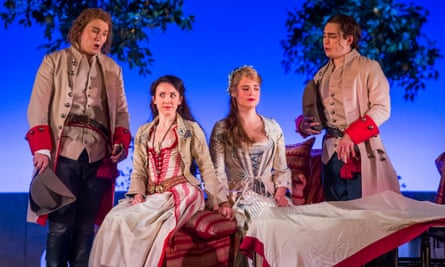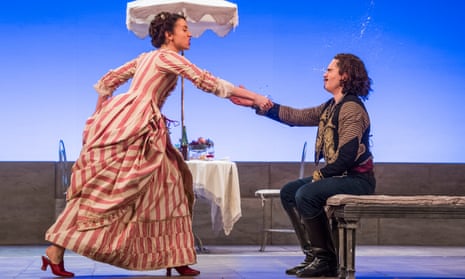Glyndebourne has always honoured Mozart as its patron saint. That’s good for Glyndebourne and, largely, good for Mozart. But one side-effect of having such a close association with a particular composer is that the company has to keep renewing the work. Nicholas Hytner’s 2006 production of Così fan tutte, Mozart and Da Ponte’s tricky comedy, is to be retired from touring after this run, which is a shame as it is one of the most intelligent and insightful stagings of this work around.
In Vicki Mortimer’s designs it is also still one of the best looking, with its azure sky, honey-coloured walls and lemon trees bathed in Mediterranean, early-evening, end-of-an-era sunshine. Hytner’s staging, safe in the meticulous hands of the revival director Bruno Ravella, takes this work, with its ridiculously thin disguises and unpalatable sexual politics, and makes it work by playing it more or less straight. The ironies in Da Ponte’s text don’t register any less strongly for this, and if anything its cruelty is more apparent than ever. But then, so is its tenderness.

That’s also thanks to the energised orchestral playing, and to detailed performances from each of the six-strong cast. José Fardilha’s Don Alfonso sets things in motion. He is highly watchable, almost deadpan until his bitter pronouncement about fidelity as he rounds off the first scene, which he and the conductor Leo McFall whip up angrily to make it almost a mini aria. What has made him this way? There might also be an opera to be written about the back story of Ana Quintans’s Despina, a maid seemingly bent on world domination; she is sung with poise and point, though when in disguise she overdoes the funny voices a bit.
But this opera isn’t so much about them, and the central four characters are uncommonly well balanced. If there’s a vocal star in there, it’s Kirsten MacKinnon, who has the high notes and the low notes for Fiordiligi and everything in between. But then there’s Rachel Kelly, who plays her sister Dorabella with irresistible charm and openness, singing beautifully if without enormous variety of tone. And there’s the tenor Bogdan Volkov, who shapes glowing phrases in Ferrando’s arias and doesn’t seem to need to breathe, ever. And finally Ilya Kutyukhin, a more interesting, subtle Guglielmo than usual.
If this is indeed the last chance to catch this production, it will have been given a good send-off.

Comments (…)
Sign in or create your Guardian account to join the discussion